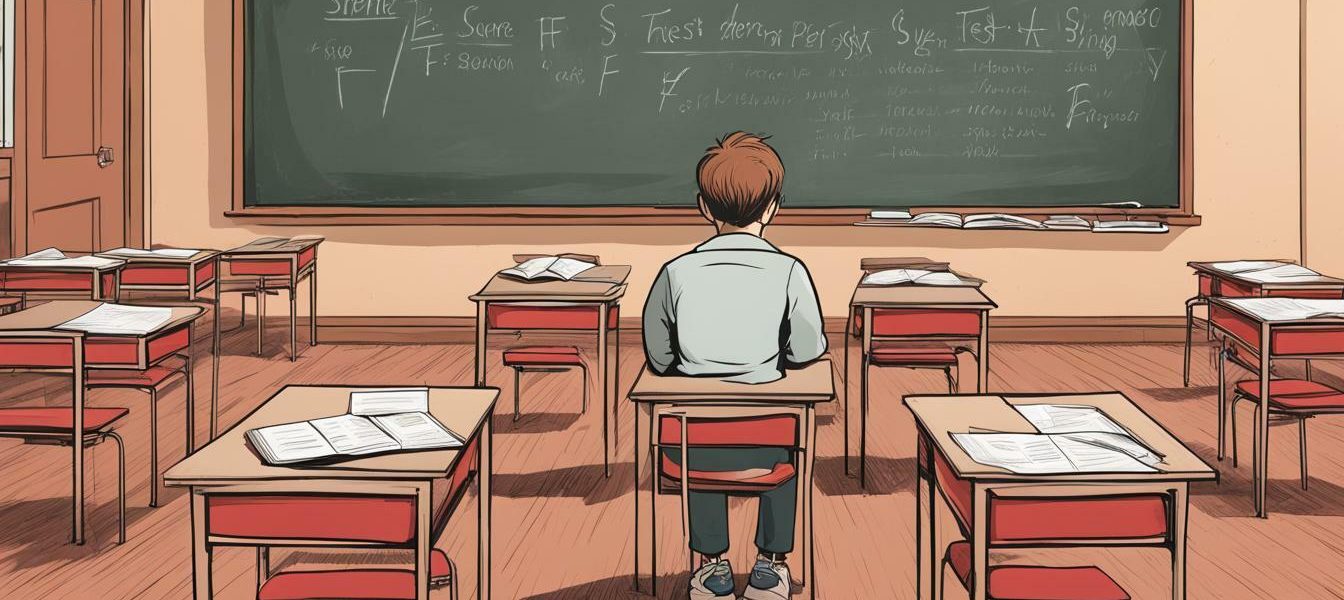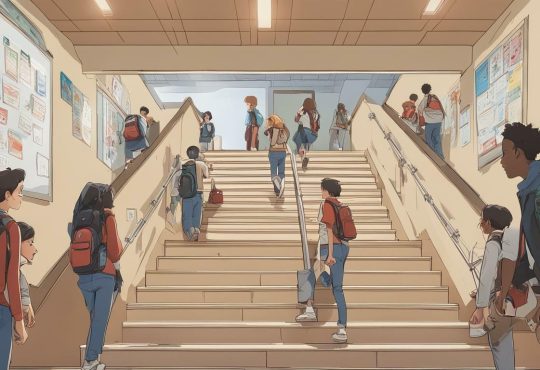
What Happens If You Fail A Class In High School
High school can be a challenging time for students, and failing a class can feel overwhelming. It’s essential to understand the consequences of failing a class and how it can impact your academic and future career opportunities.
Without the proper support and resources, failing a class can have long-lasting repercussions. It can impact your GPA, college applications, and even future job prospects. However, it’s essential to remember that failing a class doesn’t define your abilities or potential for success.
Key Takeaways
- Failing a class can have consequences on your academic and future career opportunities
- Without proper support and resources, failing a class can have long-lasting effects on your GPA and college applications
- Failing a class doesn’t define your abilities or potential for success
Understanding the Impact of Failing a Class
When you fail a class in high school, the repercussions can be significant and long-lasting. It’s important to understand the consequences of failing a high school course so that you can take appropriate action to address the issue.
One of the most immediate impacts of failing a class is on your GPA (Grade Point Average). Your GPA is a key metric that colleges and universities use to evaluate your academic performance, and failing a class can significantly lower your overall GPA. This can, in turn, limit your options when it comes to college admissions and scholarships. It’s also worth noting that some colleges and universities require a minimum GPA for admission or to maintain scholarships.
Additionally, failing a class can have a negative impact on your high school transcript, which is a record of all the classes you’ve taken and the grades you’ve received. This can also affect your prospects for college admissions and scholarships, as well as employment opportunities later in life.
But the impact of failing a class goes beyond just academic performance and prospects. Failing a class can also have a significant emotional and psychological impact, leading to feelings of shame, inadequacy, and low self-esteem. It’s important to recognize these feelings and seek out appropriate support and resources to help you cope.
Understanding the Impact of Failing a Class: Strategies for Overcoming
If you’ve failed a class, there are several steps you can take to address the issue and mitigate the impact:
- Seek out academic support and intervention programs: Many high schools offer programs designed to help students who are struggling in their classes. These may include tutoring, study groups, or individualized support from teachers or counselors. Take advantage of these resources to get the help you need.
- Consider retaking the class: Depending on your school’s policies, you may be able to retake the class you failed. This can help improve your GPA and academic standing, as well as provide an opportunity to master the material. Just be sure to understand the impact on your transcript and future prospects before making this decision.
- Communicate with your teachers and counselors: Don’t be afraid to speak with your teachers and counselors about your challenges and seek guidance and support. They may be able to offer advice or connect you with additional resources.
By taking these steps and adopting a growth mindset, you can turn the experience of failing a class into an opportunity for learning, growth, and improvement.
Academic Support and Intervention Programs
High schools offer a variety of academic support and intervention programs to help students who are struggling with their classes. These programs can range from individualized tutoring and mentorship to in-class support and after-school study sessions.
One common type of academic support program is the Student Assistance Program (SAP). This program provides individualized support to students who are experiencing academic, social, emotional, or behavioral challenges. The SAP team includes teachers, counselors, and other school staff who work together to identify issues and develop a plan to support the student.
Another popular academic support option is after-school tutoring. Many high schools offer free tutoring sessions to students in various subjects, providing additional assistance and practice outside of class time. Some schools also offer peer tutoring programs, allowing students to work with classmates who excel in a particular subject.
Special Education and 504 Plans
For students with disabilities or learning differences, high schools also offer special education and 504 plans. These plans provide accommodations and support to help these students succeed in their classes. Examples of accommodations include extra time on tests, note-taking assistance, and modified assignments.
504 plans are designed for students with a disability that impacts their ability to learn and perform in school. These plans outline specific accommodations that schools must provide to ensure access to education. Special education plans, on the other hand, are designed for students with more significant disabilities or learning differences. These plans provide more individualized support and services, such as one-on-one instruction or specialized curriculum.
Overall, if you are struggling in a class, it is important to explore the academic support and intervention programs offered by your high school. These programs can provide additional resources and assistance to help you succeed and overcome academic challenges.
Repeating a Class: Retaking a Course in High School
If a student fails a high school class, they may have the option to retake the course. This can be beneficial for improving their understanding of the subject and potentially raising their GPA. However, it is important to keep in mind that retaking a course may also have consequences.
When a student retakes a class, both the failed grade and the new grade will appear on their transcript. The failed grade will remain a part of their GPA calculation unless the high school has a policy for replacing grades. While retaking the course can improve their understanding and potentially raise their GPA, it may not completely erase the impact of the failed grade.
It is also important to consider the impact on future academic opportunities. Some colleges and universities may consider both grades when evaluating a student’s application, and may question their ability to succeed in college if they see a history of failing and retaking classes in high school.
Retaking a Class: Process and Considerations
If a student is considering retaking a class, they should first speak with their school counselor to understand the process and any potential consequences. Depending on the high school’s policies, retaking a class may require the student to attend summer school, take an online course, or repeat the entire school year.
Before retaking the course, it is important to evaluate why the student failed the class in the first place. If they simply did not understand the material, then retaking the course may be beneficial. However, if they struggled with time management, study habits, or other factors, they should address those issues in addition to retaking the course.
Additionally, students should consider the impact on their schedule and workload. Retaking a class may mean sacrificing time for other activities, such as extracurriculars or part-time jobs.
Overall, retaking a class can be a good option for improving academic performance and understanding of a subject. However, students should carefully consider the potential consequences and evaluate whether it is the best option for them.
Communicating with Teachers and Counselors
When facing challenges in a class, it’s important to reach out to teachers and counselors for support. They can provide valuable guidance and resources to help you overcome academic obstacles. Here are some tips for effective communication:
- Be proactive: Don’t wait until the last minute to seek help. Reach out to your teacher or counselor as soon as you start to struggle.
- Be honest: Explain your challenges and areas of difficulty in the class. This will help your teacher or counselor understand how to best support you.
- Listen: Pay attention to the advice and feedback given by your teacher or counselor. They have experience helping students and can provide valuable insights.
- Ask questions: Don’t be afraid to ask for clarification or additional resources to help you improve your understanding of the material.
“By communicating effectively with your teachers and counselors, you can gain the support and resources you need to succeed academically.”
Understanding Transcript Impact and College Applications
Failing a class can have significant consequences for a student’s high school transcript and college applications. When a student fails a class, it is typically noted on their transcript with a failing grade.
Having failing grades on a transcript can negatively impact a student’s chances of being accepted into their preferred college or university. Admissions officers often view failing grades as a lack of effort or motivation, which raises concerns about a student’s academic ability and readiness for college-level coursework.
Addressing Transcript Impact
If you have failed a class, it is important to take action to address the impact on your transcript. One way to do this is to retake the class and earn a passing grade. This can help improve your overall GPA and demonstrate to colleges that you are capable of overcoming academic challenges.
Another option is to take additional courses in the same subject or related areas to show a commitment to improving your understanding of the material. This can be particularly helpful for students who may struggle in a specific subject area but excel in others.
Explaining Failure on College Applications
When applying to colleges, it is critical to explain any failing grades on your transcript. This may involve writing a supplemental essay or providing an explanation in the “additional information” section of your application.
Be honest about the reasons for your failure, but also be sure to explain what you learned from the experience and how you have grown as a student. Admissions officers are often more interested in seeing how students respond to failure than they are in seeing a perfect transcript.
It is important to be proactive in addressing the impact of failing a class on your transcript and college applications. With the right approach and mindset, you can turn a temporary setback into an opportunity for growth and learning.
Seeking Additional Academic Resources
If you’re struggling with a particular subject, don’t hesitate to seek out additional academic resources to help you understand the material better. There are a variety of resources available that can cater to different learning styles and preferences.
One resource to consider is academic tutoring. Many high schools have tutoring programs available where you can receive one-on-one help from a teacher or tutor. This can be particularly helpful if you have difficulty with specific concepts or need additional guidance on how to study effectively.
Another option is online resources, such as Khan Academy or SparkNotes, which can provide additional explanations, practice problems, and study guides. These can be accessed from anywhere with an internet connection and can be a helpful supplement to classroom learning.
Finally, consider forming study groups with classmates who are also struggling in the same subject. Collaborating with peers can provide additional perspectives and insights on the material and can help you work through difficult concepts together.
Failing a Class vs. Dropping a Class
It’s important to understand the difference between failing a class and dropping a class. When a student fails a class, they receive a failing grade on their transcript, which can have negative consequences on their GPA and college applications. On the other hand, dropping a class means that the student has withdrawn from the course before completion. There are different rules and deadlines for dropping a class, depending on the school’s policy.
When considering dropping a class, it’s essential to take into account the potential consequences. Dropping a class may affect a student’s eligibility for extracurricular activities, athletic teams, or club memberships. Additionally, it may impact the student’s graduation timeline and delay their progress towards their academic goals.
On the other hand, failing a class can have more severe consequences, such as losing scholarships, repeating the course, or being placed on academic probation. It’s important to weigh the options and consider seeking academic support before making a decision.
If a student is struggling in a class, dropping the course may be a viable option if they can’t improve their grades and meet the academic requirements. However, it’s crucial to seek support from teachers, counselors, or academic advisors before making any decisions.
Coping with Failure and Embracing Growth
Failing a class in high school can be a frustrating and disappointing experience. It’s important to remember that failure is a natural part of the learning process and can offer an opportunity for growth and improvement.
If you find yourself struggling with a particular subject or class, it’s essential to seek support from teachers, counselors, or academic advisors. They can provide guidance and resources to help you overcome academic challenges and achieve success.
It’s also crucial to practice self-care and manage your emotions when dealing with disappointment or failure. Take time to reflect on your mistakes and think about how you can learn from them. Seek the support of friends and family to help you cope with the emotional impact of failure.
Remember that failure does not define your worth or potential as a student. With hard work, dedication, and the right mindset, you can overcome academic challenges and achieve your goals. Use your setbacks as an opportunity to learn and grow, and embrace the journey of academic success.
Developing Effective Study Habits and Time Management Skills
Developing effective study habits and time management skills is key to preventing or overcoming academic challenges. Here are some practical tips to help you improve your study habits and make the most of your time:
- Create a schedule: Creating a schedule can help you manage your time effectively. Use a planner or calendar to map out your study time, homework assignments, and other activities. Be sure to include breaks in your schedule to prevent burnout.
- Minimize distractions: Find a quiet, distraction-free space to study. Turn off your phone and notifications to minimize distractions. If you find yourself frequently distracted, consider using website blockers or apps that limit your screen time.
- Take breaks: Taking breaks is important for maintaining focus and preventing burnout. Try the Pomodoro technique, which involves working for 25 minutes and taking a five-minute break before starting again. You can adjust the length of work and break periods to suit your needs.
- Use active learning strategies: Active learning strategies, such as summarizing, self-quizzing, and teaching others, can help you retain information better than passive learning strategies like re-reading.
- Seek help when needed: Don’t hesitate to reach out to teachers, tutors, or academic support services if you’re struggling with a subject. They can provide additional resources and support to help you succeed.
- Make time for self-care: Taking care of your physical and mental health is important for academic success. Make time for exercise, sleep, and relaxation to reduce stress and improve your overall well-being.
By implementing these tips and strategies, you can improve your study habits and time management skills, setting yourself up for academic success.
Utilizing Tutoring and Academic Support Services
If you are struggling with a particular subject in high school, it is important to take advantage of the various academic support services that are available to you. These resources can provide you with the additional assistance and guidance you need to improve your understanding and performance in challenging subjects.
One of the most common academic support services available in high school is tutoring. Many schools offer tutoring programs where students can work one-on-one with a tutor who is knowledgeable in the subject they are struggling with. Tutors can help identify areas where a student needs additional help, provide additional explanations and examples, and help develop effective study strategies that can lead to improved performance.
Another academic support service that high schools often offer is after-school study sessions or academic workshops. These sessions are typically led by teachers or other academic professionals and can provide additional instruction and practice in challenging subjects. Attending these sessions can be a great way to get extra help and support in a particular subject, as well as to connect with other students who may be struggling with the same material.
In addition to these formal academic support services, there are also many online resources available that can help you improve your understanding of a particular subject. Websites such as Khan Academy, Quizlet, and SparkNotes offer a wealth of information and practice exercises that can help you gain mastery over challenging material.
Ultimately, the key to success in high school is to take advantage of the many academic support services that are available to you. Whether it’s working with a tutor, attending after-school study sessions, or utilizing online resources, there are many ways to get the help and support you need to succeed academically.
Conclusion: Turning Failure into Opportunity
While failing a class in high school can have significant consequences, it is important to remember that failure is not the end. It can be an opportunity for growth, learning, and personal development. By understanding the impact of failing a class and utilizing the resources available, students can overcome academic challenges and achieve their goals.
One of the most important things to remember is that seeking help is never a sign of weakness. Academic support and intervention programs, tutoring services, and communication with teachers and counselors can all provide valuable assistance to students who are struggling in a class. Developing effective study habits and time management skills can also go a long way in preventing or overcoming academic challenges.
It is also important to view failure as a learning opportunity. By analyzing what went wrong and developing a plan for improvement, students can use their experiences to grow and develop as individuals. Coping with failure can be difficult, but with resilience and a positive mindset, students can turn their setbacks into opportunities for personal growth.
Ultimately, failing a class does not define a student’s worth or potential for success. It is simply a part of the academic journey, and with the right mindset and resources, it can be overcome. By embracing failure as an opportunity for growth and utilizing the available resources, students can achieve their goals and succeed academically.



